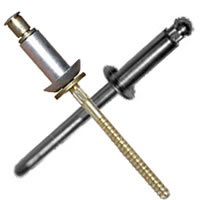
Fasteners play an important role in aerospace manufacturing. Whether powered by turbofan or turboprop engines, all airplanes have fasteners. A typical Boeing 747, in fact, has roughly 3 million fasteners.
Some types of fasteners, however, are better suited for aerospace manufacturing than others. If you’re building an airplane, you may want to choose cherry rivets. Cherry rivets offer several advantages that make them a popular choice for aerospace manufacturing.
Vibration Resistant
You don’t have to worry about vibrations causing cherry rivets to loosen. Cherry rivets are permanent fasteners that, like other permanent fasteners, are protected from vibrations.
Airplanes are often exposed to vibrations. Vibrations can come from the engines, landing gear, auxiliary power units (APU), turbulence and other sources. Fortunately, cherry rivets are protected from vibrations. They won’t loosen or fall out — even when exposed to strong vibrations over a prolonged period.
Only Requires Access to a Single Side
Cherry rivets only require access to a single side of the parts with which you use them. What does this mean exactly?
Cherry rivets are fasteners that are used to secure two or more parts together. They are technically classified as “blind rivets” because of their installation method. You can install cherry rivets and other blind rivets by only accessing one side of the parts with which you use them. As long as you can access the front of the parts, for instance, you can secure them together with one or more cherry rivets; you don’t need to access the back of the parts.
Corrosion Resistant
In addition to being vibration resistant, cherry rivets are corrosion resistant. They can withstand humidity and moisture without succumbing to the effects of oxidation.
Many other types of fasteners lack the corrosion-resistant properties of cherry rivets. Over time, they will begin to rust or corrode. If left unchecked, heavily corroded fasteners may fail to secure the parts with which they are used.
Versatile
There’s no denying the fact that cherry rivets are versatile. You can use them in a variety of materials, such as steel and aluminum.
Cherry rivets even support the use of composites. Composite materials, of course, have become increasingly popular in the aerospace manufacturing industry. They are often stronger and lighter than traditional metals and alloys. With cherry rivets, you can secure composite parts together. Cherry rivets will spread evenly during installation to prevent cracking with composite parts.



